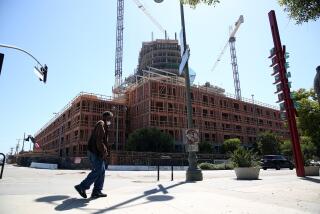Housing Starts Drop Off 7.2% for January : Construction: Analysts predict the figure will bounce back thanks to favorable mortgage rates and the recovery.
WASHINGTON — Construction of new homes fell 7.2% in January, the government said Wednesday. Analysts attributed the drop to bad weather and an unsustainable increase in building in December.
Unless the weather turns bad again this month, the analysts added, housing starts should turn up again, boosted by favorable mortgage rates and a gradually improving economy.
“The economy is growing more strongly, interest rates remain low and consumer confidence continues to be high,” said economist David Berson of the Federal National Mortgage Assn. “All that will translate into more starts.”
The only remaining dark cloud, analysts warn, is the possibility that the Clinton Administration may impose higher taxes that could dampen the demand for new homes and apartments that emerged last year.
The Commerce Department reported that starts totaled 1.19 million at a seasonally adjusted annual rate in January, the lowest level since July, when new construction dipped to a 1.11-million rate. Last month’s decline was the largest since starts fell 16.9% last April.
Starts were down sharply in both the Northeast and West. They also fell in the Midwest, but rose in the South.
“Hopefully, this starts number was an aberration,” said David Lereah, an economist with the Mortgage Bankers Assn. “Our projection is well over 1.3 million (for 1993). But it’s not a good way to start the new year.”
Analysts noted that starts jumped 4.8% in December, to a 1.29-million annual rate, and ended the year 18.4% above those in 1991. But they contend that growth this year will be only about 9% and that the 4.8% advance in December overstated the industry’s strength.
Sales of both new and previously owned homes rose in December, reducing inventories and providing incentives for further building.
At the same time, mortgage rates are at a 20-year low, and the Mortgage Bankers Assn. says loan applications, a leading indicator of sales, remain strong.
Applications for building permits, often a barometer of future activity, edged down 1.7% to a 1.18-million rate.
“This decline in permits would not suggest as drastic a decline in starts as 7.2%,” said Marilyn Schaja, an economist with Donaldson, Lufkin & Jenrette Securities Corp. in New York. “We expect a bounce back in starts in upcoming data.”
New construction of single-family homes was off 5.6% to a 1.07-million rate, the first decline in six months. These starts had risen 4% a month earlier.
But the multifamily component, which is overbuilt in many areas of the country, fell even further, down 19.7% to a 122,000 rate. Construction of larger apartments--five units or more--dropped 21.7% to a 94,000 rate, the lowest on record. The previous record low was 98,000 in December, 1991.
David F. Seiders, an economist with the National Assn. of Home Builders, expressed concern that demand for new housing, suppressed during the recession, could be sapped if the speculation about tax hikes for those earning $30,000 or more proves correct.
“If they’re going to cut that far into the income strata, you have to hope it will not hurt people’s buoyant outlook,” Seiders said. “It certainly can’t help.”
Administration officials were scrambling to calm fears about the tax proposals in President Clinton’s package, presented to Congress Wednesday evening.
“We feel that once the full outlines of the plan are clear to the American people and to the financial markets that there will be a positive response,” Deputy Treasury Secretary Robert Altman said in a television interview. He said reports were “exaggerated” about the tax hit.
Regionally, overall starts plunged 21.6% in the West, to a 222,000 rate. That was the biggest decline since a similar drop in October, 1990. The rate was the lowest since 192,000 in March, 1991.
More to Read
Inside the business of entertainment
The Wide Shot brings you news, analysis and insights on everything from streaming wars to production — and what it all means for the future.
You may occasionally receive promotional content from the Los Angeles Times.










